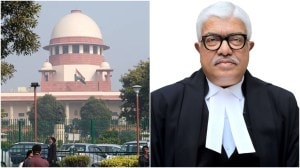Ritu Sarin is Executive Editor (News and Investigations) at The Indian Express group. Her areas of specialisation include internal security, money laundering and corruption. Sarin is one of India’s most renowned reporters and has a career in journalism of over four decades. She is a member of the International Consortium of Investigative Journalists (ICIJ) since 1999 and since early 2023, a member of its Board of Directors. She has also been a founder member of the ICIJ Network Committee (INC). She has, to begin with, alone, and later led teams which have worked on ICIJ’s Offshore Leaks, Swiss Leaks, the Pulitzer Prize winning Panama Papers, Paradise Papers, Implant Files, Fincen Files, Pandora Papers, the Uber Files and Deforestation Inc. She has conducted investigative journalism workshops and addressed investigative journalism conferences with a specialisation on collaborative journalism in several countries. ... Read More
Mr Hold-all
HEADS of intelligence agencies are usually apolitical.M K Narayanan is an aberration to the rule. Following his stint as head of the Intelli...

 HEADS of intelligence agencies are usually apolitical.M K Narayanan is an aberration to the rule. Following his stint as head of the Intelligence Bureau and the Joint Intelligence Committee between 1989-1992 and given his proximity to then Prime Minister Rajiv Gandhi, he acquired a halo of brilliance and reticence. But all along he was seen as someone ‘‘in’’ with the first family of the Congress.
HEADS of intelligence agencies are usually apolitical.M K Narayanan is an aberration to the rule. Following his stint as head of the Intelligence Bureau and the Joint Intelligence Committee between 1989-1992 and given his proximity to then Prime Minister Rajiv Gandhi, he acquired a halo of brilliance and reticence. But all along he was seen as someone ‘‘in’’ with the first family of the Congress.
After he retired in 1992, Narayanan followed the time-tested formula adopted by most retired senior civil servants and cops. He turned columnist and joined some prominent thinktanks. A Tamil Nadu-cadre IPS officer, Narayanan settled down to uneventful retirement, occasionally hitting the Capital’s seminar circuit. That is, till recently. In May this year, he was called by Manmohan Singh’s PMO asking him to take over the position of the PM’s Special Advisor on internal security matters.
For a few days, Narayanan, 70, let on that he would continue to live in Chennai (his family apparently wanted that) and spend about two days a week in the PMO. But that, it soon became clear, was unrealistic and Narayanan moved out from an IB guest house to his present official residence in Teen Murti Lane.
When Narayanan joined the PMO with a Minister of State rank, it was widely expected that he would have a higher profile than, for instance, A S Dulat, the former RAW Chief who held a similar post in the Vajpayee PMO. There was one more factor that made the timing of his return to the power centre crucial. The outgoing government had left a little bombshell behind for the new one. Informing them about the disappearance of senior RAW operative Rabinder Singh, it advised them to take serious corrective measures to purge the external intelligence agency.
First it was National Security Advisor J N Dixit, and within days M K Narayanan, admitting that the Rabinder Singh episode was the reason for an omnibus review of the functioning of both the IB and RAW, one that Narayanan would undertake.
Narayanan himself discussed the review and the deficiencies in the two organisations in a rare frank interview. Just four months into his new job, he spoke his mind on how work was being divided in the PMO; the deteriorating work culture in the agencies; the trouble spots he was focusing on.
These were words from someone who knew that he enjoyed the confidence of the Prime Minister and had, to some extent, sorted out the tussle for turf—between himself and Dixit. And then, typically, Narayanan withdrew into his shell. He had reasons to. On his desk shortly, landed all the sensitive documents and video evidence against Rabinder Singh and just a few days ago, the sleuth is known to have handed over his secret report to the Prime Minister.
NARAYANAN was also put in the forefront of several attempts to resolve a host of seemingly intractable internal security problems. There was Manipur and Nagaland and in December his much-publicised message to Assamese litterateur Indira Goswami that the Prime Minister was willing to hold consultations with ‘‘any disaffected’’ group in the country, including ULFA rebels.
And now within two days of Dixit’s death earlier this week, the PMO announced that Narayanan would hold charge as the interim NSA. Narayanan says he’s going to be doubly careful of not losing his original assignment of Security Advisor, but again, that’s a typical response from the super-sleuth who knows he’s now close to landing the NSA job on a permanent basis. Never mind if the Capital is swirling with names of people who might replace him and the diplomatic community is lobbying hard to retain the NSA’s post.



- 01
- 02
- 03
- 04
- 05





























